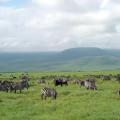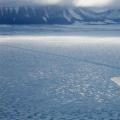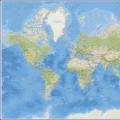Chernozem is an ideal soil ...
V.V. Dokuchaev
more expensive than any oil, all kinds of coal,
more expensive than gold and iron ores
Vasily Vasilyevich Dokuchaev is a famous geologist, mineralogist, but, above all, he is the founder of soil science.
Soil science - the science of soils, their formation (genesis), structure, composition and properties, patterns of geographical distribution, rational use.
Initially, people identified soil with land- the area of the surface on which a person lives. With the emergence of agriculture, the idea of soil as a relatively loose earthy layer in which land plants take root and which is the subject of agricultural cultivation.

(1846 – 1903)
Such a simple understanding of the soil persisted until the appearance of works Vasily Vasilyevich Dokuchaev.
He discovered the basic laws of genesis (origin) and geographic location of soils ... He pointed to the special position of the soil in nature, which is determined by the fact that both mineral and organic compounds are involved in its composition.
Proved that an integral part of the soil - living phase - living organisms : root systems of plants, soil animals, microorganisms.
Vasily Vasilievich first established that the soil – it is an independent natural body, qualitatively different from all other bodies of nature.
Vasily Vasilyevich Dokuchaev was born on February 17 (March 1) 1846 in the village of Milyukovo, Smolensk province. He was the third child in a large family of priest Vasily Sergeevich Dokuchaev and Pelageya Trofimovna.
From 1861 he studied at the Smolensk Seminary, fellow practitioners gave him the nickname "Bashka", since he was the first in the teaching. After graduating with honors from the theological seminary in 1867, Vasily was sent to the St. Petersburg Theological Academy. There he studied for only three weeks.
During this time he attended public lectures on natural science given by the leading professors of St. Petersburg. Carried away by science, young Dokuchaev goes to study at the natural department of the Physics and Mathematics Faculty of St. Petersburg University.
Such outstanding personalities as geologist Alexander Aleksandrovich Inostrantsev, scientist-agronomist Aleksandr Vasilievich Sovetov, botanist Aleksey Nikolaevich Beketov, outstanding chemist Dmitry Ivanovich Mendeleev taught at the university.
Vasily was especially carried away and awakened a love of science by the interesting and witty lectures of the professor of mineralogy Platon Alexandrovich Puzyrevsky.
Student Dokuchaev led a half-starved existence, earning a living by tutoring. But, despite the difficult financial situation, he showed an unprecedented enthusiasm for science. In addition to lectures and seminars, he drew knowledge from books, sitting for a long time in the library. He began to receive a scholarship only in the third year (a scholarship was then very rare and was awarded only to certain successful students).
After graduating from the university, he remained at the Faculty of Natural Sciences as a conservator (keeper) of the mineralogical collection and held this position from 1872 to 1878. For many years Dokuchaev taught mineralogy at the Institute of Civil Engineers.
From 1871 to 1877 scientist on assignments of the St. Petersburg Society of Naturalists and the Mineralogical Society and the Free Economic Society, of which he was a member, made a number of expeditions to northern and central Russia and southern Finland in order to study the geological structure, method and time of formation of river valleys and the geological activity of rivers.
Dokuchaev managed to collect a lot of factual data that contradict all existing hypotheses about the origin of river valleys in the European part of Russia. He put forward his own hypothesis, linking this process mainly with the activity of ravines and gullies.
Interestingly, the 32-year-old scientist was not afraid to criticize the views of recognized authorities and discard outdated hypotheses.
He summarized the results of his research in his master's thesis “ Formation methods of river valleys in European Russia”, Which he successfully defended in 1878, and in 1880 was elected assistant professor of the Department of Mineralogy.
From 1877 to 1881 Vasily Vasilievich was devoted to the study of Russian chernozem; for this purpose, they made, on behalf of and at the expense of the Imperial Free Economic Society, multiple trips to the south and southeast of Russia, the Crimea and the North Caucasus.
The fruits of many years of research are presented in the monograph “ Russian black soil”, Which was his doctoral dissertation, defended by him in 1883. This work brought Dokuchaev world fame and deservedly considered the basis of genetic soil science .
Studying the black earth strip, Vasily Dokuchaev, of course, did not ignore the Ukrainian soils: from the Donetsk region to Bukovina. Gave them a scientific classification. He concluded that "chernozem is an ideal soil", which can and should become the "king of soils", because "more expensive than any oil, all kinds of coal, more expensive than gold and iron ores."
At the invitation of the Poltava provincial zemstvo, he in 1888-1894. carried out a large-scale study of the soils of the Poltava province.
The expedition included both experienced and young pupils of Dokuchaev: Georgy Nikolaevich Vysotsky, Vladimir Ivanovich Vernadsky, Konstantin Dmitrievich Glinka, Gabriel Ivanovich Tanfilyev and others. The results of the work done were published in 16 volumes of the report.

During this campaign for the first time, gray forest soils were identified and thoroughly examined , as well as the study of salt licks has begun .
In Poltava, as before in Nizhny Novgorod, Dokuchaev created a natural history museum with a soil department.
Work in the Poltava province finally confirmed it in the regularity of the genesis of soils, a view of the soil as a dynamic complex capable of evolution, which recognized now by soil scientists all over the world .
He identified seven world zones: boreal, northern forest, forest-steppe, steppe, dry steppes, aerial desert zone, subtropical.
In 1889 Dokuchaev prepared a collection of soils for the World Exhibition in Paris. In addition to their samples, it included the corresponding maps, images of sections, tables, diagrams, etc. "As a representative of V. Dokuchaev", the future creator of the biosphere doctrine was engaged in this exposition and demonstrated the collection Vladimir Vernadsky... The collection received a gold medal, and Vasily Dokuchaev, as an organizer, was awarded the order “ Merit in agriculture».
In 1891, in southern Russia, severe droughts and poor harvests caused famine among the population. Vasily Vasilievich, together with famous scientists - Clement Arkadyevich Timiryazev, Pavel Andreevich Kostychev and others - took part in the development of a program for the elimination of the consequences of this disaster.
Dokuchaev proposed a plan for the protection of chernozems. In fact, this plan provided for the reconstruction of the entire agriculture of the steppe zone in order to obtain stable high yields.
This plan included the following measures: protection of soil from washout; regulation of gullies and ravines and control of soil erosion; artificial irrigation; afforestation and creation of forest shelter belts; snow retention and regulation of melt water runoff, construction of ponds and shallow water bodies; protection of forests, waters; development of the best methods of soil cultivation, maintaining the established ratio between meadow, forest and arable land. This amazing plan is still relevant today.
Vasily Vasilyevich wrote: "If we want to deprive agriculture of the character of a stock market game ... it is absolutely necessary that all natural factors (soil, climate with water and organisms) be investigated and tested, if possible, comprehensively and certainly in their mutual connection."
In 1982, Dokuchaev published the work " Our steppes before and now", Which sets out an action plan to combat drought in the south of Russia (including the lands of Ukraine).
The collection from the sale of this book was donated to benefit the hungry.
Dokuchaev did a lot to promote the science he founded - soil science. Since 1899, on his initiative, the world's first journal "Soil Science" was published. He believed that, in addition to scientific institutes, it was necessary to open as many higher agricultural educational institutions as possible and was directly involved in the preparation of the regulation on a higher agricultural school.
 The soil map was compiled on the initiative and according to the plan of V. Dokuchaev, Scale 60 versts in inch, St. Petersburg, 1900.
The soil map was compiled on the initiative and according to the plan of V. Dokuchaev, Scale 60 versts in inch, St. Petersburg, 1900. As a true patriot and citizen, he devoted all his strength and knowledge to the practical issues of agriculture and the overall economic well-being of Russia;
According to the academician Clement Arkadievich Timiryazev, Dokuchaev was a man, " marked by the line of complete disinterestedness, sometimes reaching the almost complete oblivion of personal needs».
Vasily Vasilievich treated the soil not only with the great interest of a scientist, but also with love. Having characterized the principles of soil cover zoning, Dokuchaev concludes: “ Greater connection and genetic affinity, this is not enough - more commonwealth and even, so to speak, world self-help and love between separate elements and separate kingdoms of nature cannot be demanded».
In 1897-1900 Vasily Vasilyevich went on expeditions to the Caucasus, Central Asia and Bessarabia. In 1899, he published two works in which, based on the dependence of soils on the factors of their formation, he studied zoning law, open A. von Humboldt... Dokuchaev also came up with the idea of the book “ On the ratio of living and dead nature”, But managed to write only the first chapter for her.
In 1900, the geologist was overtaken by an attack of a serious illness. At the end of the year, he practically stopped leaving the house. Dokuchaev died on October 26, 1903.
Vladimir Ivanovich Vernadsky recalled his teacher: “In his mindset, Dokuchaev was gifted with a completely exceptional plasticity of imagination ...
Everyone who had the opportunity to begin their observations in the field under his leadership undoubtedly experienced the same feeling of surprise that I remember when, under his explanations, the dead and silent relief suddenly revived and gave numerous and clear indications of the genesis and the nature of geological processes taking place in its hidden depths ”.
Vernadsky considered his teacher Vasily Vasilyevich Dokuchaev a great scientist and put him on a par with Lavoisier, Maxwell, Mendeleev, Darwin and other outstanding representatives of science of the XIX century.
T.A. Fedorenko




